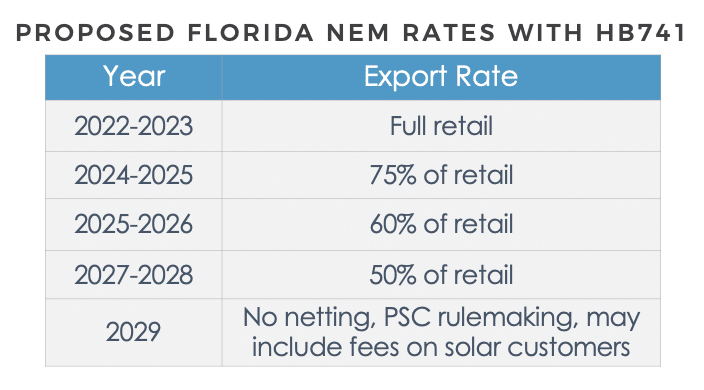Update: On April 27, Governor DeSantis vetoed the anti-solar bill HB 741. This is great news given that the bill would have denied energy freedom to some 8 million customers, decimated thousands of jobs and driven bills up for all Floridians.
The Florida legislative session is drawing to a close here in Tallahassee with steady rain falling outside and low, gray clouds hovering above the Capitol. The mood inside isn’t any sunnier for those that value energy freedom, solar choice, and jobs. That’s because the legislature just passed the anti-solar bill, HB 741, that will throttle rooftop solar development by gutting the state’s cornerstone policy for rooftop solar adoption – net metering.
The bill will be presented to Governor DeSantis where he can sign it, veto it, or allow it to become law without taking action.
The net metering policy for the state’s investor-owned utilities – Florida Power & Light (FPL), Duke Energy Florida, Tampa Electric, and Florida Public Utilities (FPUC) – currently allows the families and businesses they serve to generate power themselves with purchased or leased rooftop solar systems and offset it against the electricity they buy from their utility on a 1:1 retail rate credit basis. Customers receive a credit for any excess solar power they don’t use, which is returned to the grid. The policy not only allows customers with solar power to reduce their bills, but also provides savings to the utility’s system as well, such as reduced fuel use and transmission system line losses – thereby helping all customers.
[button color=”green” url=”https://www.savesolar.org/”]Take action, ask Gov. DeSantis to veto HB 741[/button]
Monopoly utilities shouldn’t dictate energy policy
The bill from the start was driven by unvetted and incomplete information fed to legislators by FPL and other monopoly utilities. The utility argument was that net metering creates a “cost” on non-solar customers because it allows them to lower their bills, and that utility revenue loss has to be made up by other customers. Yet, the state agency charged with regulating the state’s largest power companies, the Public Service Commission (PSC), has never made a determination of the costs and benefits of rooftop solar on any utility’s system in Florida. That didn’t matter to the sponsors of the bill, who conceded there was no study performed to verify the utility claims and that any cost or subsidy was almost non-measurable at the current low level of rooftop solar penetration in Florida.
HB 741 was written and promoted by FPL, the state’s largest power company, and filed by legislators in November 2021. The solar industry, customers, and a number of organizations urged legislators to do a study before making arbitrary changes to the state’s net metering policy. These organizations, including us at the Southern Alliance for Clean Energy, pointed out that the three biggest monopoly utilities requested rate increases last year and not one identified lost revenue from rooftop solar as a reason for the request.
Additionally, FPL negotiated a minimum bill provision, as part of its rate case settlement, that guarantees that low-energy- use customers, like net-metered customers, will never have bills less than $25/mo. FPL also stated during its rate case that the provision ensures that low-energy-use customers pay their fair share to cover the utility’s fixed costs. Duke negotiated a similar $30 minimum bill provision as part of its rate case settlement.
It begs the question if solar customers are paying their fair share, why are monopoly utilities going after them again?
HB 741 looks more and more like a solution in search of a problem. This is no way to make energy policy, especially one that is poised to decimate rooftop solar adoption, destroy thousands of jobs, and deny energy freedom to over 8 million Florida families and businesses.
By the numbers
If signed by Governor DeSantis, HB 741 will end the state’s current 1:1 retail-credit net metering policy on December 31, 2023. From 2024 through 2028, it will phase down the retail credit for power provided by customers. The rates will be grandfathered-in for 20 years (from the date of net metering application approval) for existing solar customers and those who adopt solar in the ensuing years. In 2029, all electricity provided by the utility will be purchased at the retail rate and all power sent back to the grid will be credited at the utility’s wholesale rate – effectively ending net metering. This framework, highlighted below, will gut the value proposition for rooftop solar leading to a throttling of solar adoption and loss of thousands of jobs.

It’s important to note that the draconian 2029 provision can be triggered early if solar adoption reaches a 6.5% penetration level in a utility’s service territory. This threshold sounds reasonable, but don’t be misled. It is based on the aggregate power rating (capacity) of rooftop solar generation divided by the utility’s peak demand. Solar penetration numbers are typically expressed as the percentage of rooftop solar-generated electricity against the utility’s retail electricity sales (which is about 1% in Florida), not its capacity. Duke Energy Florida is already at roughly 4.5% rooftop solar capacity penetration and could conceivably exceed 6.5% well before 2029 as customers rush to install solar systems prior to the December 31, 2023, full retail rate deadline.
The governor should stand with Floridians and energy freedom
Let’s be clear, rooftop solar doesn’t raise power bills, it’s an investment in assets, like power plants, and expenses to operate them, like fuel costs that drive higher bills. FPL, for instance, is passing on $810 million dollars in higher fossil gas costs to families and businesses this year – which is, in part, forcing some customers to choose between paying a power bill and putting food on the table. Net metering provides a choice for customers to lower power bills – including a growing percentage of low to middle-income customers. Yet, the proposed changes to the policy will make solar adoption uneconomic and put solar choice out of reach of hard-working families and small businesses.
Contact Governor DeSantis and urge him to veto HB 741
The governor should stand with Floridians and veto the anti-solar bill. Let’s embrace clean energy policies that support jobs, lower bills, and energy freedom; instead of killing them at the behest of monopoly utilities.
[button color=”green” url=”https://www.savesolar.org/”]Have your voice heard and protect solar choice[/button]












